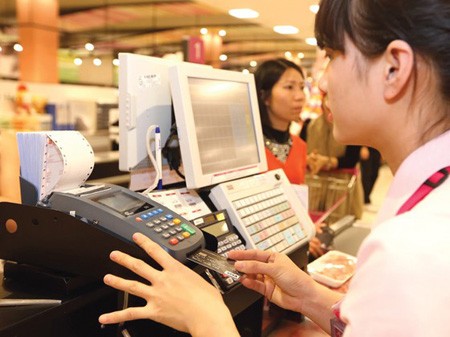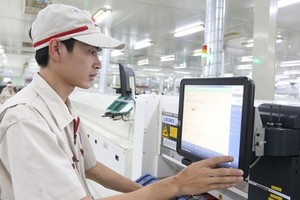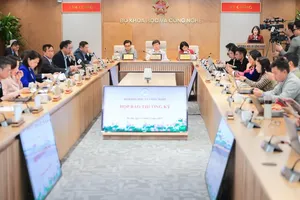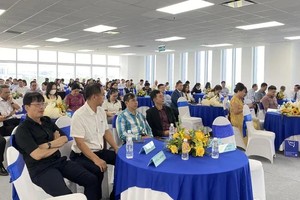
According to the Prime Minister, digital economy is a key to national growth. Therefore, he advised that MIC should encourage the development of technology enterprises in Vietnam, especially digital technology ones, in hope of transforming the country into a technologically advanced nation.
Among the new tasks assigned to MIC this year, Prime Minister Phuc especially concentrated on building the Vietnamese digital technology business community to be the foundation for digital economy growth.
Particularly, the Prime Minister asked that MIC submit a detailed strategy for the development of digital technology enterprises to the Government this January.
Commenting that the motto ‘Make in Vietnam’ is a declaration about the transformation from passively fulfilling customers’ orders to actively creating new technological products, PM Phuc supported the proposal of Minister of Information and Communications Nguyen Manh Hung that IT businesses should be the leader.
Another important goal of MIC in 2020 is the implementation of IT into constructing an electronic government based on administration reform and procedure standardization, centralizing citizens and businesses. This, in turn, can greatly help to successfully establish a digital government, economy, and society in Vietnam.
As explained by Deputy Minister of Planning and Investment Vu Dai Thang, ‘digital economy’ is all economic activities performed on a digital platform, which is the result of the digital transformation process in Industry 4.0. this definition is the foundation for his ministry to prepare various development strategies.
Digital economy is a part of the national economy, said Deputy Minister of Science and Technology Bui The Duy. It includes models to create digital products and services as well as corresponding supports for businesses in need. Therefore, the development of this economy sector is the use of common state-of-the-art technologies like cloud computing, artificial intelligence, or big data to allow enterprises handle a larger workload amount and make wiser decisions.
Deputy Minister of Information and Communications Nguyen Thanh Hung stated that the encouragement of digital economy means the creation of novel commercial models while existing businesses are trying to innovate their manufacturing and trading processes to form an ecosystem. Technologies are also applied to adjust services and goods in accordance with user feedbacks.
Certain successful stories of emerging enterprises such as Grab, Uber, and Airbnb are typical examples of this digital economy in Vietnam.
Obviously, on the macroscopic scale, Vietnamese people are aware of the essential role of digital economy and Industry 4.0 in their life. Yet on the microscopic scale, there still exists several problems.
At the moment, the Agency of e-Commerce and Digital Economy under the Ministry of Industry and Trade is responsible for managing this field. However, via the name change suggestion, the PM wished for MIC to take charge of this field as well, which might create complexities, let alone the real operation of digital economy relating to the ministries of Finance and Science & Technology as in the case of Grab taxi company.
Another issue lies in human resources. According to MIC, high-leveled staff in the fields of IT, computing technology, automation cannot meet the market demands. Predictions show that there is a human resources need increase of 47 percent a near, while universities can only supply 8 percent. What is more, among those graduates, 72 percent do not have sufficient practical experience and 42 percent lacks the basic soft skill of team work. Evidently, human resources shortage in Vietnam is not an easy matter to tackle immediately.
Resolution No.52 issued by the Politburo on September 27, 2019 on policies to actively participate in Industry 4.0 clearly stated that in 2030, digital economy must account for 30 percent of GDP. In order to fulfill this goal, Minister Hung said that Vietnam must innovate its thinking to make way for breakthroughs to happen. Also, the successful digital transformation process should become the foundation for digital economy and society, leading to more innovations.
Thus, this year is considered the year of national digital transformation. There will be thorough transformations in operation procedures and working styles in all fields in Vietnam.
The country should change from using cheap, low-leveled labor and unsystematically exploiting natural resources into implementing more cutting edge technologies and equipment, which is the knowledge economy and digital economy, to claim victory in Industry 4.0.
























